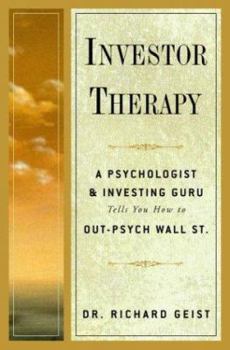Investor Therapy: A Psychologist and Investing Guru Tells You How to Out-Psych Wall Street
Select Format
Select Condition 
Book Overview
If your investing strategy has relied on the facts-financial statements, annual reports, technical charts, and so on-congratulations! You're on the way to becoming a successful, complete investor. But... This description may be from another edition of this product.
Format:Hardcover
Language:English
ISBN:0609609165
ISBN13:9780609609163
Release Date:September 2003
Publisher:Crown Business
Length:308 Pages
Weight:1.30 lbs.
Dimensions:1.1" x 6.4" x 9.5"
Customer Reviews
4 ratings
Head Job
Published by Thriftbooks.com User , 16 years ago
The real value in this book is taking the time to read and reflect on the many skills an investor should have developed. It is not a "fun" read. It is not a book you cannot put down! It should be read over time (like a textbook) and not digested quickly. Some insights may be helpful, like knowing why you hold on to securities that turn out to be losers. It is unlikely to help you decide precisely when to sell but it may free your thinking to know there is a time and you should deal with it. I suggest taking the time to read the book. Expect what you usually get from a book on Psychology.
emotions and money? read this book
Published by Thriftbooks.com User , 20 years ago
This is a book both every investor and financial advisor should read. Rather than proposing a scheme for eliminating emotions from your investment decision-making, which is the mantra of most books, Geist cogently argues that emotions are always present in risky decisions. His solution is not to ignore them, but instead to understand them and see how they idiosycratically afftect our investment choices.Investor Threapy is one of the only books I've read that makes clear how profound the ramifications actually are of integrating emotions into investment decision-making. The book clearly spells out in an easily readable way how emotions influence not only when we buy and sell, but what sectors of the market we choose to play in, how we gauge our own risk level, how we repond to herd mentality, how we deal with loss, and how we so often mismatch our personality to an investing style.Geist offers a fascinating view of how to understand management, and why it is so important to invest along side a group of trusted others-what he calls Interpersonal Investing. Any reader of this book will come away with information and ideas not published anywhere else on how to use our emotions to enhance our perfomance and results.
Dealing with the Inner Game of Investing
Published by Thriftbooks.com User , 20 years ago
Reviewer: A reader from Winchester, MAAbout half way through this book, I made the same mental connection that I made about 20 years ago when I read Tim Gallwey's classic, "The Inner Game of Tennis."That is, this is a very fresh and relevant way to look at a complex game phenomenon with a very quiet and objective mind.While this may not be a book for the technically sophisticated investor, it is highly recommended for a wide range of investors that are looking to create and sustain a personal psychological advantage on the market.In many ways, this is a book that enables the reader to look at the market in a Zenlike way. Rather than dealing with winning investment strategies, it deals with an often overlooked and more important aspect of investing: creating and managing winning emotional strategies. Without sounding overly Eastern in philosophy, Dr. Geist deals with strategies to help the average investor focus more of their energies on understanding their personal emotional reactions to the market. His thesis is that you can achieve greater happiness and success by integrating an emotional understanding of yourself into your investing strategies. Like Gallwey, Dr. Geist provides the reader with a much needed perspective and tools for helping to manage the most difficult opponent we all face, our own emotional inner game.
Mixed feelings.
Published by Thriftbooks.com User , 21 years ago
Let me first say that I like this book better than most of the other investing psychology books out there that I have examined. But I have two problems with the book. First, there is an investor psychology test at the back of the book which is also available on a website. My question is, especially after reading the test questions, how scientific is this test? I doubt that it really tells the taker anything but many will be suduced by it anyhow. Most of this material I have seen is either rubbish or Mickey Mouse. Second, any investor that needs this material does not need this material. In other words any investor that does not already understand this material independent of the book a priori is certainly not in need of studying this book and then attempting to beat the market with his/her new found knowledge. My own experience is that the psychological equipment needed to truly outwit the market is necessarily the result of long hard experience, not reading books. The completely clueless may find solace here but until the material is internalized it is probably of not much use. The book provides no help on internalization.






